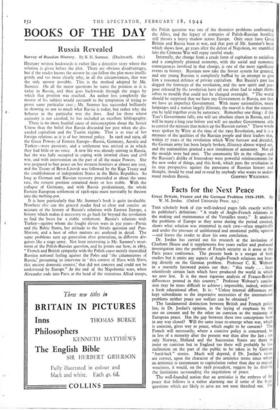BOOKS OF THE DAY
Russia Revealed
Survey of -Russian History. By B. H. Sumner. (Duckworth. 16s.)
HISTORY written backwards is rather like a detective story where the solution is given before the plot. There are obvious disadvantages, but if the reader knows the answer he can follow the plot more intelli- gently and see more clearly why, in all the circumstances, that was the only answer possible. This is the method adopted by Mr. Sumner. On all the major questions he states the position as it is today in Russia, and then goes backwards through the stages by which that position was reached. An author less completely the master of his subject would succumb to the temptation of trying to prove some particular case ; Mr. Sumner has succeeded brilliantly in showing us not so much what Russia is today, but rather why she behaves in the particular way she does. And for those whose curiosity is not satisfied, he has included an excellent bibliography.
There is no more fruitful cause of misconception about the Soviet Union than the belief that Russia discarded her past when she dis- carded capitalism and the Tsarist regime. That is as true of her foreign relations as it is of her internal policy. In 1918 and 1919, all the Great Powers of Eastern Europe—Russia, Germany, Austria and Turkey—were prostrate, and a settlement was arrived at in which they had little or no voice. A new life was already stirring in Russia, but she was fully occupied in coping with internal chaos and civil war, and with intervention on the part of all the major Powers. She was prepared to buy peace on her western frontiers at almost any cost, and the Treaty of Brest-Litovsk was followed by the Riga Treaty and the establishment of independent States in the Baltic Republics. So long as German and Russian recovery proceeded at about the same rate, the eastern position remained more or less stable. With the collapse of Germany, and with Russia predominant, the whole Eastern European settlement of 1918-1920 must inevitably be thrown into the melting-pot.
It is here particularly that Mr. Sumner's book is quite invaluable. Nowhere else can the general reader find so clear and concise an account of the history of Russia's relations with Eastern Europe, a history which makes it necessary to go back far beyond the revolution to find the bases for a stable settlement. Russia's relations with Turkey—against whom she fought eleven wars in 25o years—Persia and the Baltic States, her attitude to the Straits question and Pan- Slavism, and a host of other matters are analysed in detail The same problems turn up generation after generation, in different dis- guises like a stage army. Not least interesting is Mr. Sumner's treat- ment of the Polish-Russian question, and he points out how, in 1863, "French and British sympathy with the Polish cause merely intensified Russian national feeling against the Poles and 'the calumniators of Russia,' presuming to intervene in 'this contest of Slays with Slays, this ancient domestic contest,' that did not concern and could not be understood by Europe." At the end of the Napoleonic wars, when Alexander rode into Paris at the head of the victorious Allied troops, the Polish question was one of the thorniest problems confronting the Allies, and the legacy of centuries of Polish-Russian hostility still throws a heavy shadow across Europe. Only once have Great Britain and Russia been at war, and that part of Mr. Sumner's book which shows how, 40 years after the defeat of Napoleon, we stumbled into the Crimean War will repay careful study. Internally, the change from a crude form of capitalism to socialism and a completely planned economy, with the social and economic consequences involved in that change, is one of the most significant events in history. Russians now take the Soviet system for granted, and any young Russian is completely baffled by an attempt to give him a reasoned defence of private capitalism. But Russia's past has dogged the footsteps of the revolution, and the new spirit and pur- pose released by the revolution have all too often had to adapt them- selves to moulds that could not be changed overnight. "The world should be surprised that we have any Government in Russia, not that we have an imperfect Government. With many nationalities, many languages and a nation largely illiterate, the marvel is that the country can be held together even by autocracy. Remember one thing : if the Tsar's Government falls, you will see absolute chaos in Russia, and it will be many a long year before you will see another Government able to control the mixture that makes up the Russian nation." These words were spoken by Witte at the time of the 5905 kevolution, and it is a measure of the qualities of the Russian people and their leaders that, within 27 years of the revolution which Witte foresaw and dreaded, the German army has been largely broken, illiteracy almost wiped out, and the nationalities granted a new instalment of autonomy. Not all the moulds were bad ones. The community life in the villages and the Russian's dislike of heterodoxy were powerful reinforcements for the new order of things, and this book, which puts the revolution in its true perspective against the panorama of Russian history and thought, should be read and re-read by anybody who wants to under-


























 Previous page
Previous page